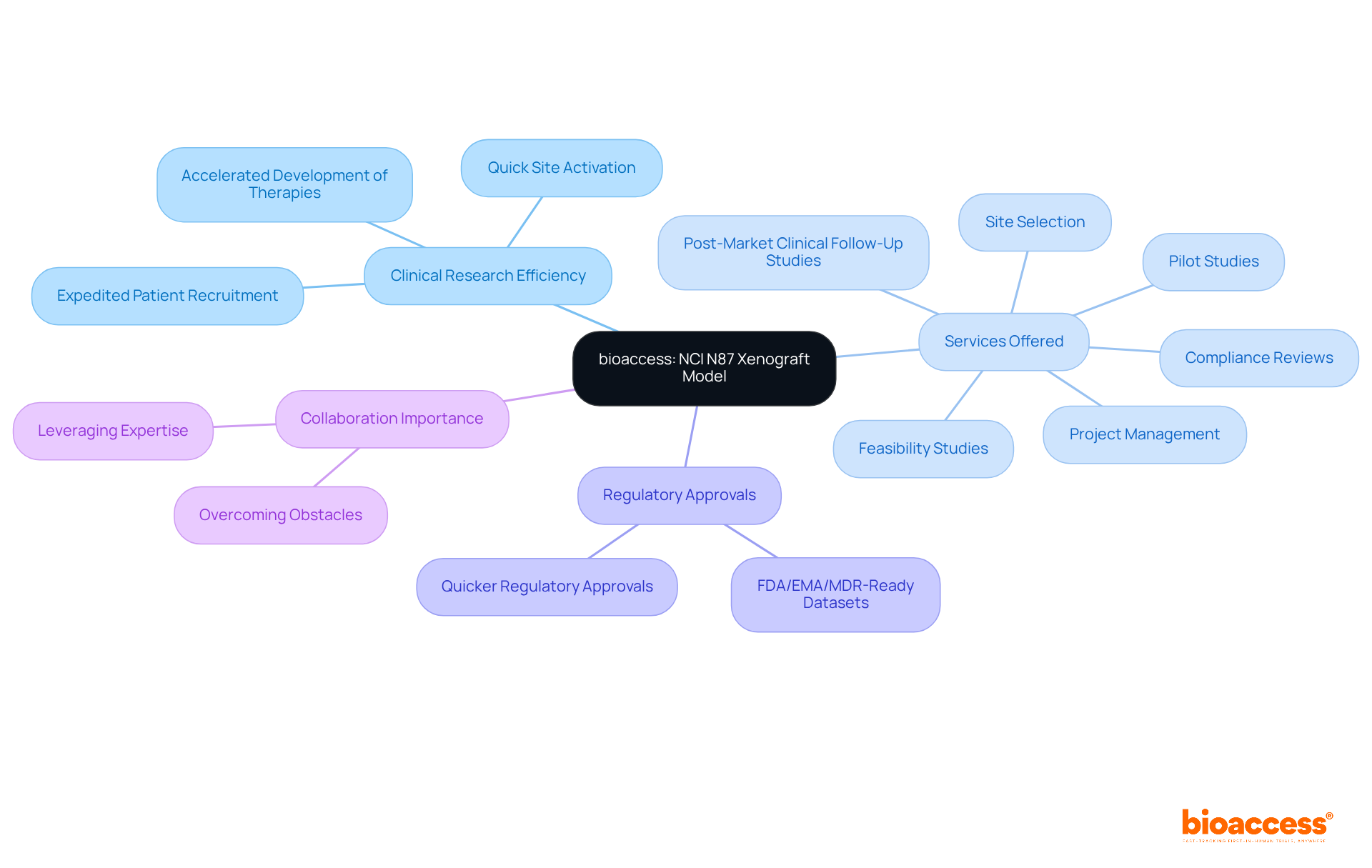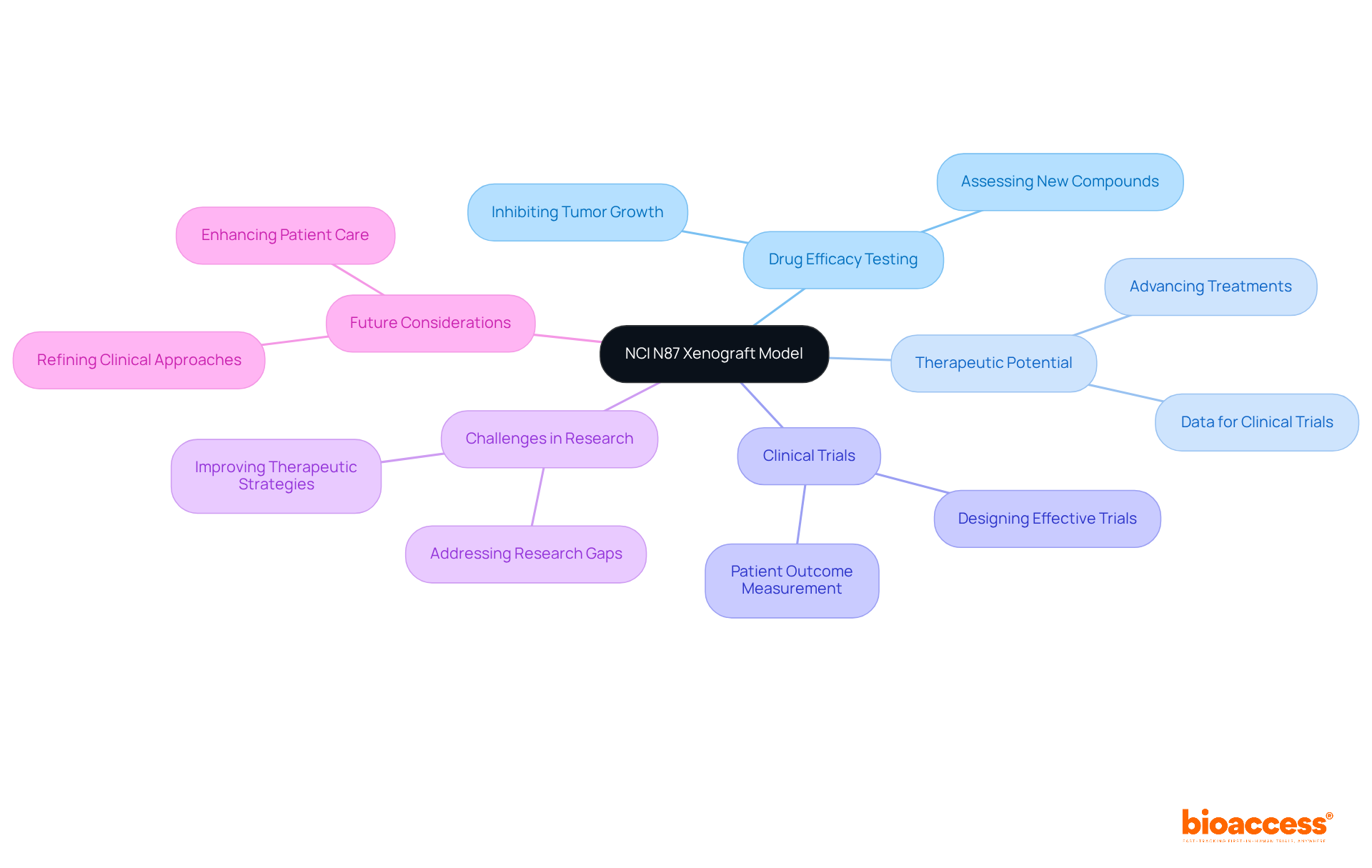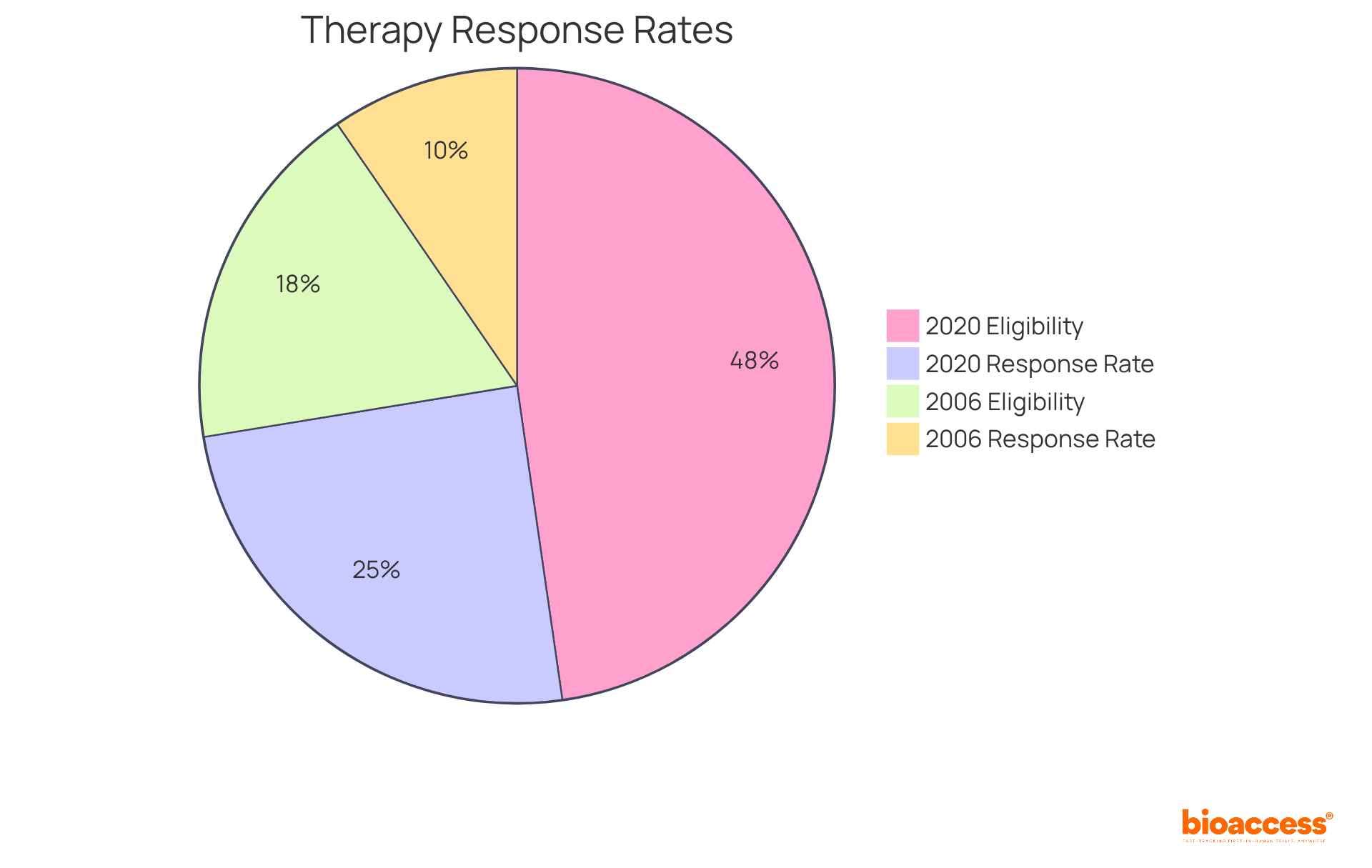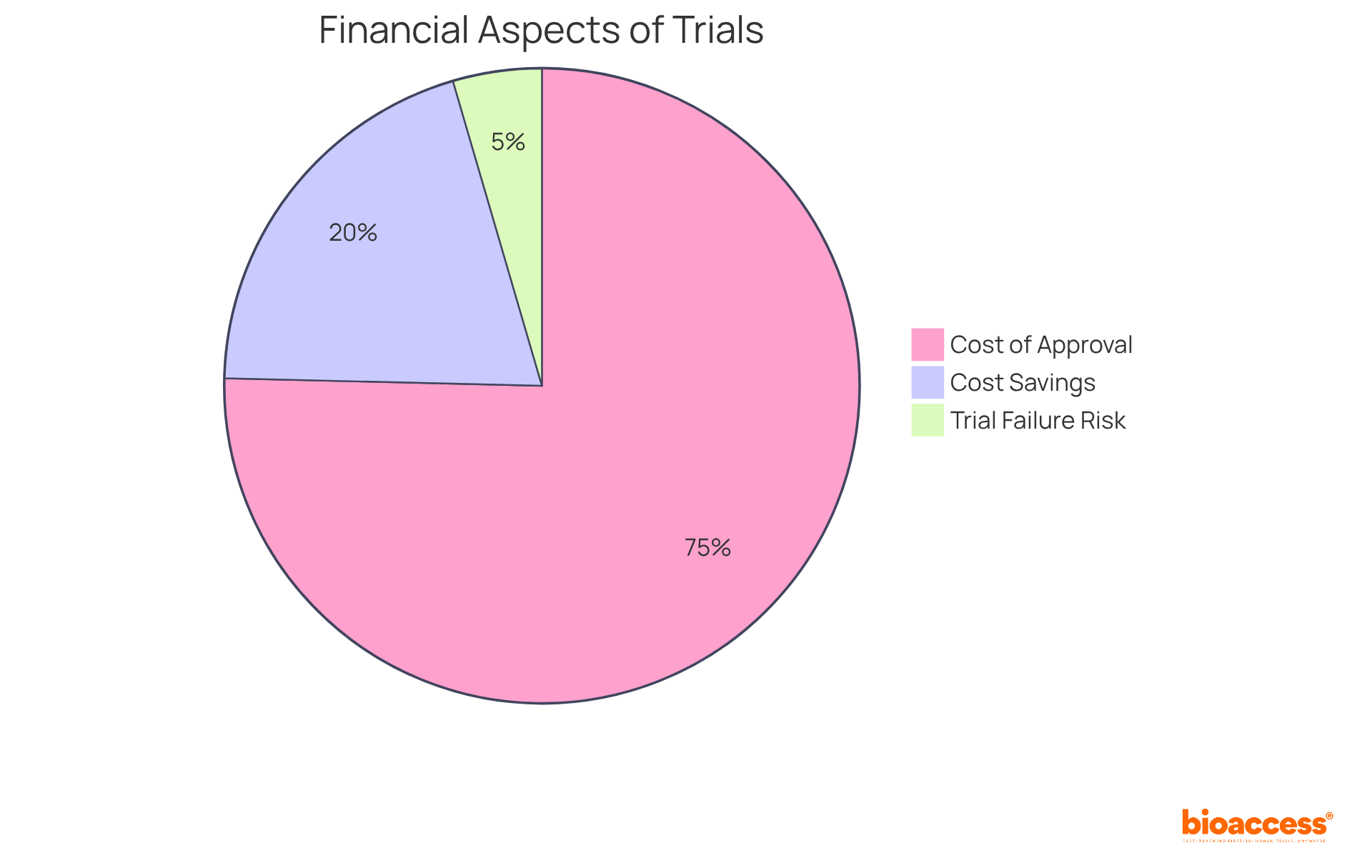


The landscape of clinical research is rapidly evolving, with innovative models like the NCI N87 xenograft framework leading the charge in enhancing the effectiveness of studies focused on gastric cancer. This model not only accelerates the development of new therapies but also offers researchers critical insights that can significantly improve patient outcomes. As the demand for faster and more accurate drug development increases, it raises an important question: how can the NCI N87 framework be leveraged to overcome the inherent challenges of clinical trials and ensure successful results?
By addressing these challenges head-on, the NCI N87 framework stands as a beacon of hope in the quest for effective gastric cancer treatments. It provides a robust platform for researchers to explore new therapeutic avenues while ensuring that patient safety and efficacy remain at the forefront of clinical trials. This innovative approach not only fosters collaboration among researchers but also enhances the overall quality of clinical research, paving the way for breakthroughs that can transform patient care.
bioaccess® utilizes the nci n87 xenograft framework to significantly enhance the efficiency and effectiveness of clinical research in gastric cancer. This innovative approach accelerates the development of groundbreaking therapies, allowing Medtech, Biopharma, and Radiopharma firms to navigate the complexities of clinical trials with remarkable agility. With over 20 years of experience in managing clinical studies, bioaccess® provides a comprehensive suite of clinical trial management services, including:
The significance of the nci n87 framework in preclinical studies allows bioaccess to provide clients with comprehensive data that facilitates quicker regulatory approvals and market entry. This is further enhanced by expedited patient recruitment and site activation services, achieving FDA/EMA/MDR-ready datasets in under 8 weeks. As the Medtech landscape evolves, bioaccess stands at the forefront, addressing key challenges and ensuring that clients can effectively bring their innovations to market.
In conclusion, collaboration is essential in this dynamic environment. By partnering with bioaccess, firms can leverage expertise and resources to overcome obstacles in clinical research, paving the way for successful outcomes.

The nci n87 xenograft system is recognized as a pivotal advancement in predicting drug efficacy for gastric cancer. By closely mimicking human tumor biology, this system empowers researchers to more accurately forecast the performance of new therapies in clinical settings. For example, studies reveal that combining neratinib with anti-HER2 monoclonal antibodies leads to tumor growth inhibition rates exceeding 90%. This impressive predictive capability is essential for reducing the risk of failure in later trial phases, ultimately conserving time and resources for companies involved in drug development.
Moreover, the nci n87 system has proven invaluable in evaluating various treatment combinations, including inetetamab with pyrotinib, which achieved a tumor growth inhibition rate of approximately 72%. These findings underscore the framework's critical role in shaping clinical trial designs and refining therapeutic strategies. As such, it has become an indispensable resource for drug development specialists committed to combating stomach cancer.
In light of these insights, the nci n87 xenograft system not only enhances predictive accuracy but also fosters collaboration among researchers, paving the way for innovative solutions in the fight against gastric cancer.

The nci n87 xenograft system stands out for its remarkable ability to replicate the genetic and phenotypic characteristics of human stomach tumors, particularly its high HER2 expression, which is vital for targeted therapies. This tumor mimicry is essential for comprehending tumor behavior and assessing therapeutic responses, establishing it as an invaluable asset for researchers dedicated to developing targeted treatments.
Notably, studies have shown that infection with a highly virulent H. pylori strain significantly alters gene expression in the Wnt/β-catenin pathway, suggesting a potential mechanism for tumor progression in stomach cancer.
By leveraging the nci n87 framework, bioaccess increases the likelihood of success for therapies in human clinical trials, ensuring that innovations are not only effective in vitro but also translate effectively into patient outcomes.
As specialists emphasize, utilizing such frameworks is critical for advancing therapeutic strategies in HER2-positive stomach cancer.

The nci n87 xenograft system is crucial for drug efficacy testing, allowing researchers to assess the therapeutic potential of new compounds in a controlled environment. By implanting nci n87 cells into immunocompromised mice, scientists can effectively measure the efficacy of new drugs in inhibiting tumor growth and enhancing patient outcomes. This framework, referred to as nci n87, is not just a method; it has been instrumental in advancing treatments for HER2-positive stomach cancer, providing critical data that informs the design of clinical trials.
In the ever-evolving Medtech landscape, the insights gained from the nci n87 system address significant challenges in clinical research. As researchers strive to improve therapeutic strategies, the data derived from this xenograft model becomes increasingly essential. It prompts us to consider: how can we leverage such frameworks to further enhance patient care and treatment efficacy?
In summary, the NCI N87 system is more than just a research tool; it is a cornerstone of collaboration in the fight against cancer. Moving forward, it is crucial to continue harnessing these insights to refine clinical approaches and ultimately improve patient outcomes.

The nci n87 xenograft system plays a pivotal role in advancing personalized medicine, allowing researchers to investigate the effects of targeted therapies on HER2-positive gastric cancer. This framework enables the analysis of individual tumor responses, leading to the identification of the most effective treatment strategies tailored for specific patient groups. Such a targeted approach not only improves treatment outcomes but also reduces unnecessary exposure to ineffective therapies.
Consider the significant progress made in genome-targeted therapies:
Furthermore, studies that utilize the nci n87 framework have demonstrated that therapies like T-DM1 can induce apoptosis and significantly enhance therapeutic effectiveness. For instance, treated mice exhibited a reduction in tumor weight, with measurements showing 197.50 ± 21.52 mg after 23 days of treatment.
This underscores the system's essential function in developing tailored treatment plans for HER2-positive gastric cancer, emphasizing the need for continued collaboration and innovation in clinical research.

The nci n87 xenograft system stands out in the drug development landscape, offering substantial financial benefits. With reliable preclinical data, this system significantly mitigates the risk of expensive late-stage trial failures, contributing to the alarming statistic that 90% of clinical drug candidates do not succeed in trials. This high failure rate not only disrupts timelines but also leads to considerable financial burdens, with estimates indicating that the average cost for each new drug approval surpasses $1-2 billion.
Moreover, the nci n87 framework enables more efficient study designs, empowering researchers to optimize resource allocation and improve the return on investment for clinical trials. For startups and smaller companies in the Medtech and Biopharma sectors, these financial advantages are crucial as they navigate the intricate landscape of drug development with constrained budgets. By leveraging the nci n87 framework, these organizations can significantly enhance their chances of success while effectively managing costs.

The nci n87 xenograft model offers a remarkable array of collaborative research opportunities for institutions and companies, particularly within Medtech clinical studies that have a profound impact on local economies. By fostering partnerships and sharing data, researchers can explore innovative therapeutic strategies, significantly accelerating the development of new treatments. This collaboration not only creates jobs but also promotes economic growth and enhances research and development in the regions where these efforts take place.
Successful collaborations in stomach cancer research have shown that joint efforts can lead to substantial breakthroughs. Studies indicate that shared resources enhance the efficiency and effectiveness of research initiatives. Insights from leading researchers underscore the importance of these collaborations, especially in addressing the alarming rise in stomach cancer cases among younger populations. Moreover, data sharing facilitates comprehensive analyses and encourages the integration of diverse expertise, ultimately driving advancements in oncology and improving healthcare outcomes.
Recent collaborations utilizing the nci n87 framework have already begun to yield promising results, paving the way for future innovations that could transform patient outcomes in gastric cancer treatment and garner international recognition. To fully leverage the potential of the nci n87, institutions are urged to actively seek partnerships and engage in data-sharing initiatives. This collaborative environment can lead to groundbreaking advancements in cancer research and significantly contribute to the overall economic development within the healthcare sector.

The NCI N87 xenograft model stands as a pivotal advancement in clinical research, particularly within the context of gastric cancer. This innovative framework empowers researchers to enhance the accuracy of drug efficacy predictions, streamline clinical trial processes, and ultimately improve patient outcomes. Its capacity to replicate human tumor biology is crucial, facilitating the development of therapeutic strategies that resonate with real-world scenarios.
Several key benefits of the NCI N87 model emerge prominently:
Each of these aspects highlights the model's critical role in navigating the complexities of clinical trials and addressing the pressing challenges faced by Medtech and Biopharma firms. By leveraging insights from the NCI N87 framework, organizations can optimize their research efforts and bolster their chances of successful market entry.
In light of these insights, the urgency for collaboration and innovation cannot be overstated. Engaging with the NCI N87 xenograft model not only accelerates the development of new therapies but also contributes to the overarching goal of improving healthcare outcomes in gastric cancer treatment. As the landscape of clinical research evolves, embracing such advanced frameworks will be essential for driving progress and delivering effective solutions for patients.
What is bioaccess® and how does it enhance clinical research?
bioaccess® utilizes the NCI N87 xenograft framework to significantly improve the efficiency and effectiveness of clinical research in gastric cancer, accelerating the development of new therapies for Medtech, Biopharma, and Radiopharma firms.
What services does bioaccess® provide for clinical trial management?
bioaccess® offers a comprehensive suite of clinical trial management services, including feasibility studies, site selection, compliance reviews, pilot studies, post-market clinical follow-up studies, and project management.
How does the NCI N87 framework benefit preclinical studies?
The NCI N87 framework allows bioaccess to provide clients with comprehensive data that facilitates quicker regulatory approvals and market entry, along with expedited patient recruitment and site activation services.
What is the significance of the NCI N87 xenograft model in predicting drug efficacy?
The NCI N87 xenograft model closely mimics human tumor biology, enabling researchers to more accurately forecast the performance of new therapies in clinical settings, which is crucial for reducing the risk of failure in later trial phases.
Can you provide examples of drug combinations evaluated using the NCI N87 system?
Yes, studies have shown that combining neratinib with anti-HER2 monoclonal antibodies leads to tumor growth inhibition rates exceeding 90%. Additionally, inetetamab with pyrotinib achieved a tumor growth inhibition rate of approximately 72%.
How does the NCI N87 xenograft model foster collaboration among researchers?
The NCI N87 xenograft model enhances predictive accuracy and encourages collaboration among researchers, which is essential for developing innovative solutions in the fight against gastric cancer.
What is the timeframe for achieving FDA/EMA/MDR-ready datasets using bioaccess® services?
bioaccess® can achieve FDA/EMA/MDR-ready datasets in under 8 weeks through its expedited patient recruitment and site activation services.
Why is collaboration important in clinical research according to the article?
Collaboration is essential in the dynamic environment of clinical research as it allows firms to leverage expertise and resources to overcome obstacles, paving the way for successful outcomes.